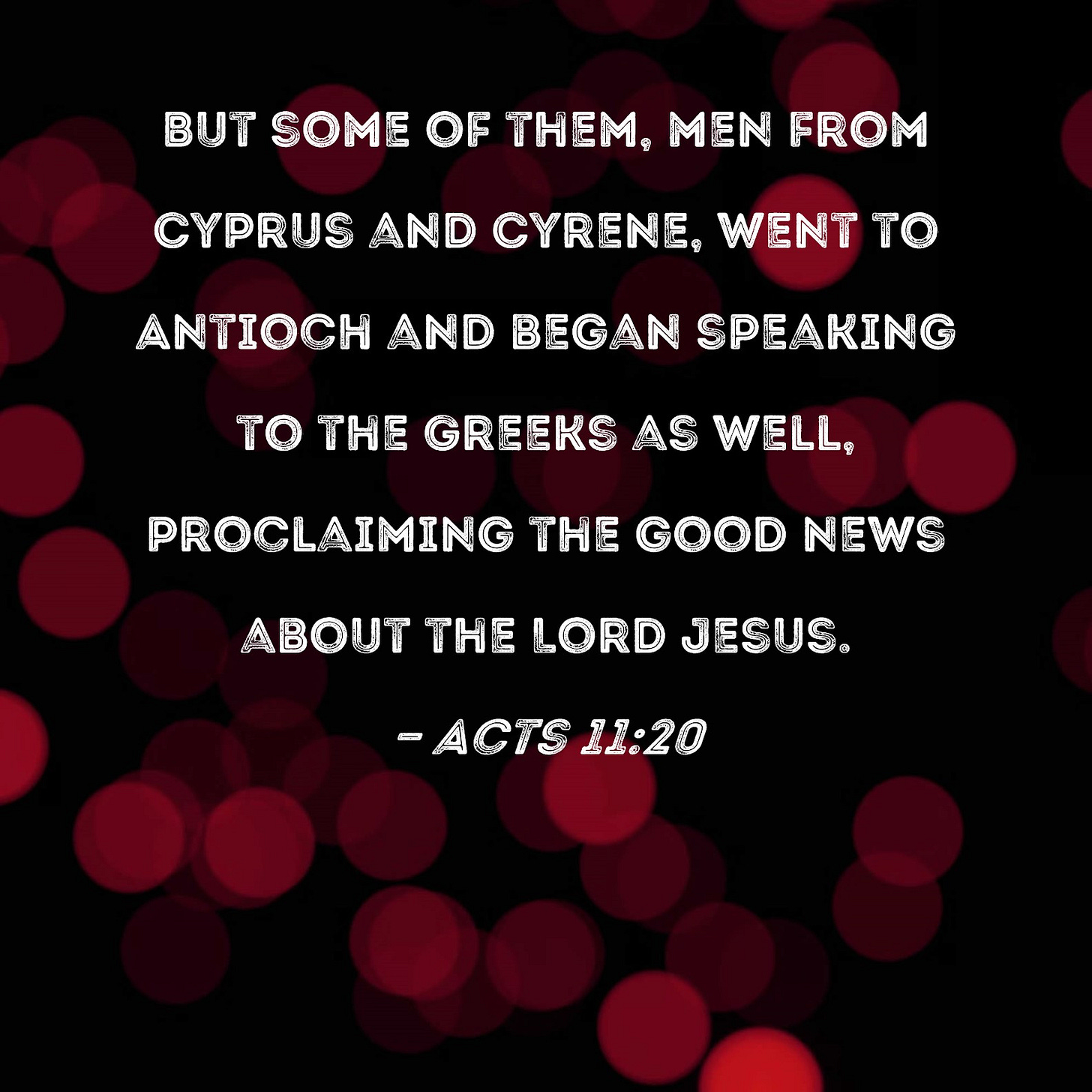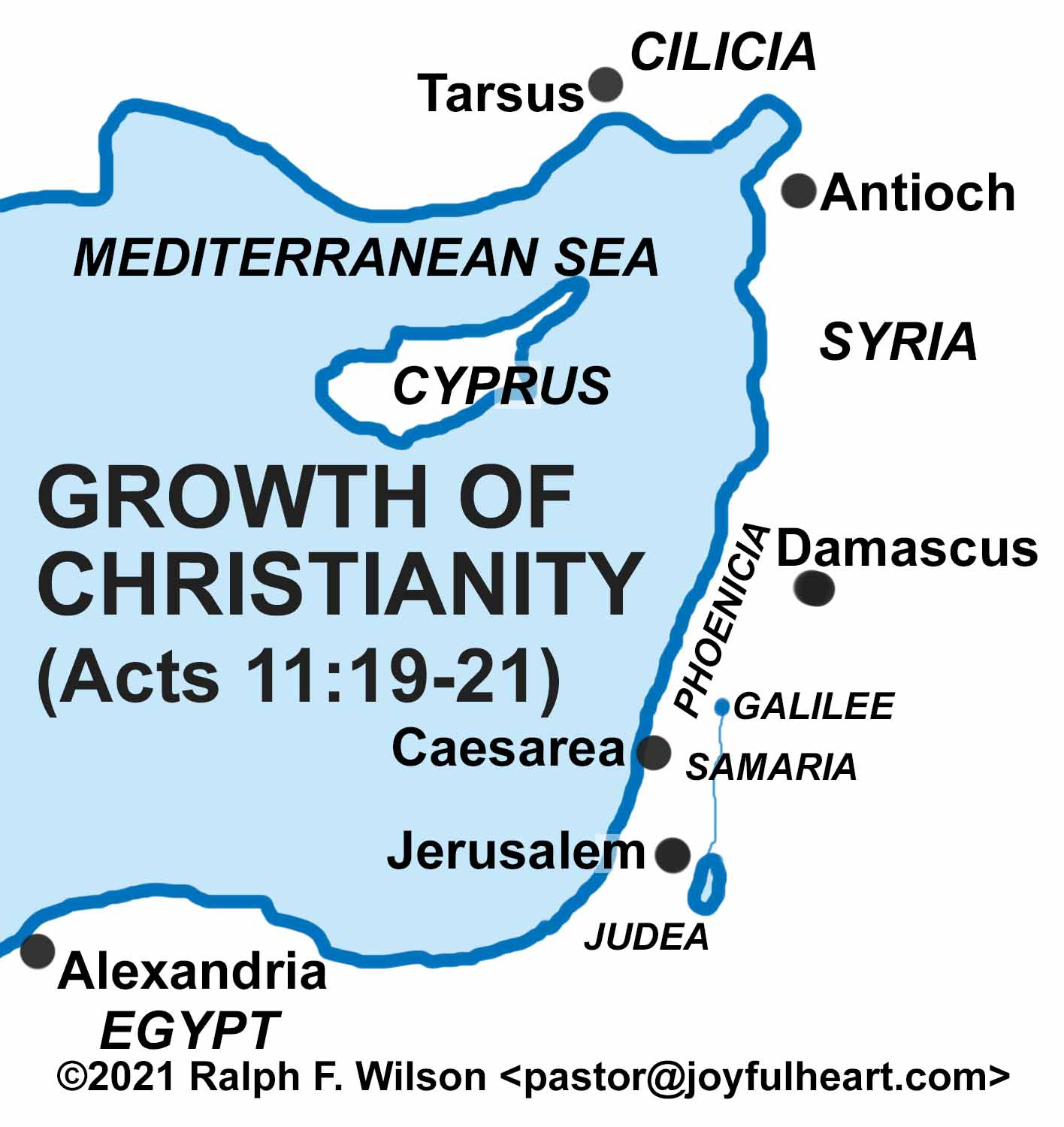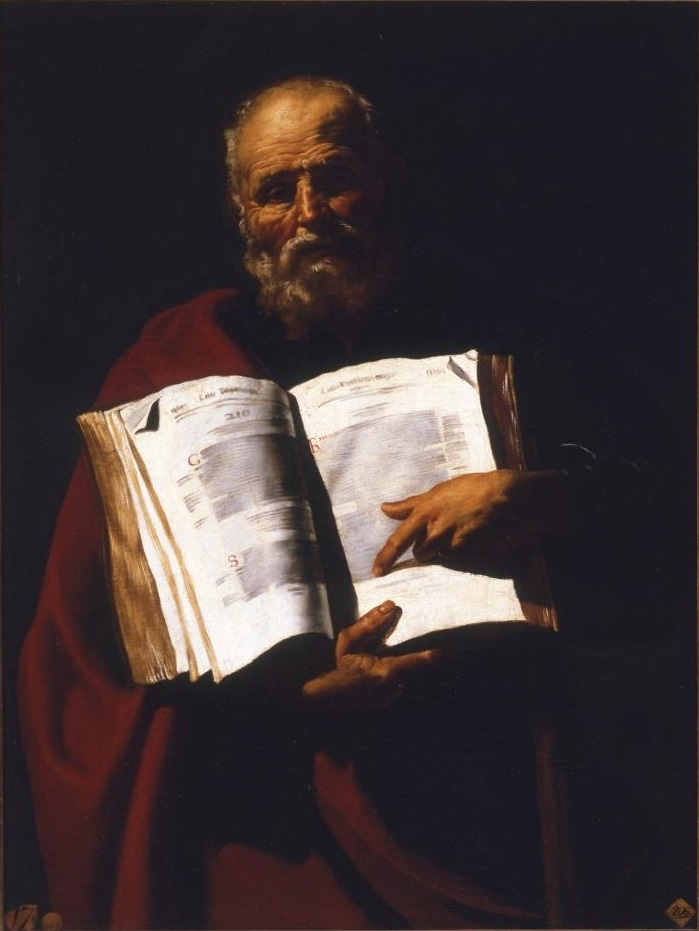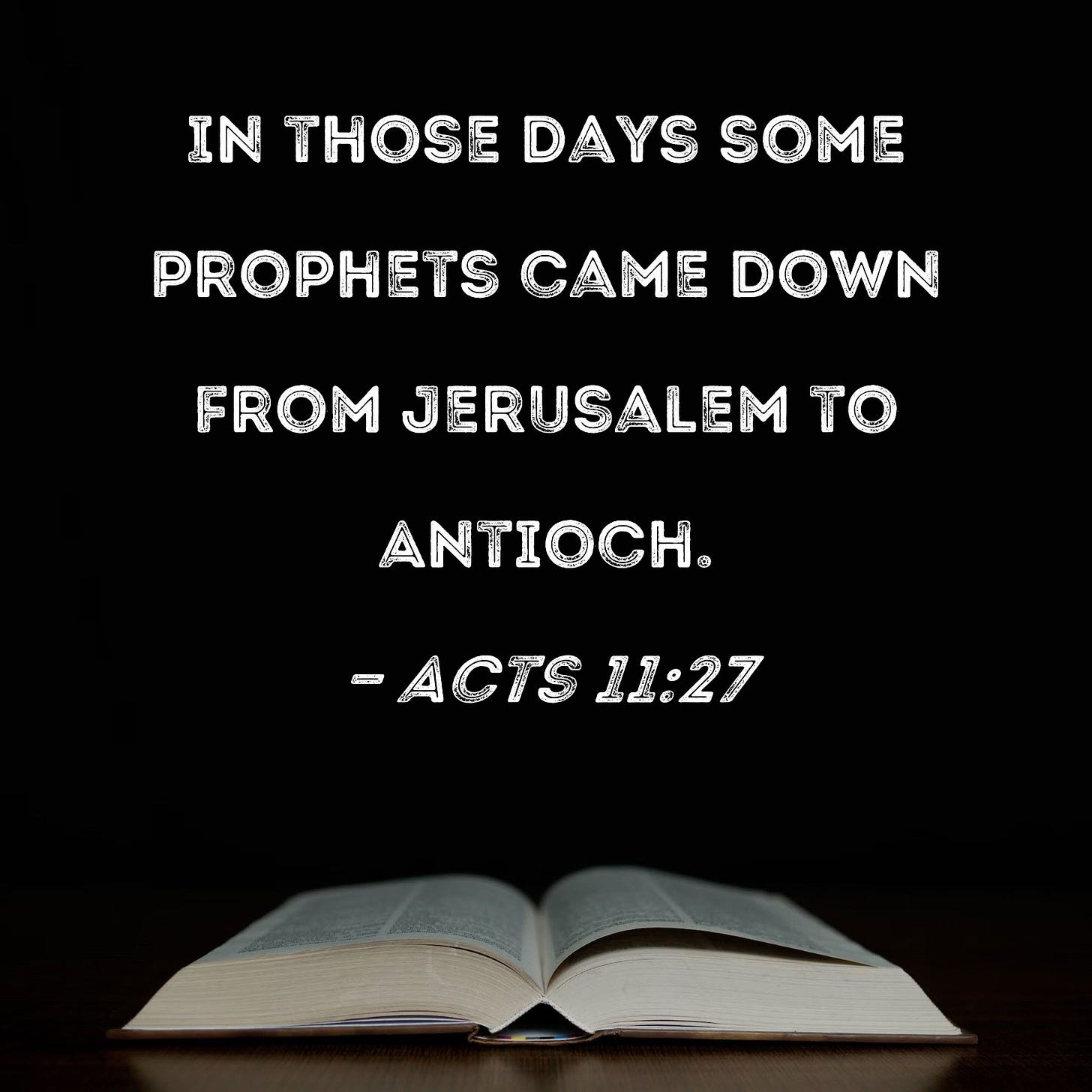A Study of Acts: The Church in Antioch
Acts 11:19-30 - Are you a usable Christian? Are you marked by His Name?
“So then those who were scattered because of the persecution that occurred in connection with Stephen made their way to Phoenicia and Cyprus and Antioch, speaking the word to no one except to Jews alone. But there were some of them, men of Cyprus and Cyrene, who came to Antioch and began speaking to the Greeks also, preaching the Lord Jesus. And the hand of the Lord was with them, and a large number who believed turned to the Lord.
The news about them reached the ears of the church at Jerusalem, and they sent Barnabas off to Antioch. Then when he arrived and witnessed the grace of God, he rejoiced and began to encourage them all with resolute heart to remain true to the Lord; for he was a good man, and full of the Holy Spirit and of faith. And considerable numbers were brought to the Lord.
And he left for Tarsus to look for Saul; and when he had found him, he brought him to Antioch. And for an entire year they met with the church and taught considerable numbers; and the disciples were first called Christians in Antioch.
Now at this time some prophets came down from Jerusalem to Antioch. One of them named Agabus stood up and began to indicate by the Spirit that there would certainly be a great famine all over the world. And this took place in the reign of Claudius. And in the proportion that any of the disciples had means, each of them determined to send a contribution for the relief of the brethren living in Judea. And this they did, sending it in charge of Barnabas and Saul to the elders.”
Acts 11:19-30 NASB1995
After Peter addresses the group in Jerusalem, the story in Acts chapter 11 then talks about those who were scattered because of persecution related to Stephen and their efforts to preach to Jews only in Phoenicia, Cyprus and Antioch. In a timeline according to some commentary I read, this is about 7 to 8 years after Stephen is martyred, but many are still so narrowly focused. The big shift happens in verse 20, where we learn about many of the believers, men of Cyrene and Cyprus, who were also speaking to the Greeks (Gentiles) in Antioch. The hand of the Lord was with these men who preached and many were converted.
So where is Antioch? Here’s a map showing the location of this important area:
Enduring Word has more information about this city of Antioch and those who preached there:
Some of them were men from Cyprus and Cyrene…spoke to the Hellenists, preaching the Lord Jesus: These unnamed disciples from Cyprus and Cyrene are genuine heroes. They began the first mentioned “mission to the Gentiles” (here called Hellenists) in Antioch.
In Antioch, we have the first example of Christians deliberately targeting Gentiles for evangelism, and this effort had great results (a great number believed and turned to the Lord).
When they had come to Antioch: Antioch was founded about 300 B.C. by Seleucus I, one of the inheritors of Alexander the Great’s empire. He liked to make a city and name them after his father, Antioch, and he did this about fifteen times. This city of Antioch was called “Syrian Antioch” or “Antioch on the Orontes.” In the first century it was a city of more than half a million people; today it is a Turkish city with a population of about 3,500.
Antioch was about 300 miles (480 kilometers) north of Jerusalem and about 20 miles (32 kilometers) inland from the Mediterranean Sea. Many considered Syrian Antioch the third greatest city in the Roman Empire, behind Rome and Alexandria. Antioch was known for its business and commerce, for its sophistication and culture, but also for its immorality.
“The city’s reputation for moral laxity was enhanced by the cult of Artemis and Apollo at Daphne, five miles distant, where the ancient Syrian worship of Astarte and her consort, with its ritual prostitution, was carried on.” (F.F. Bruce)
According to Hughes, when the ancient Roman senator Juvenal wanted to describe the decadence of Rome, he said that “The Orontes has flowed into the Tiber,” flooding Rome with wickedness.
One might say that Jerusalem was all about religion; Rome was all about power; Alexandria was all about intellect, and Athens was all about philosophy. Adding to that, one might say that Antioch was all about business and immorality.
When the Gospel came to Cornelius and he became a follower of Jesus, it came to a man who was already a God-fearer. He had a respect for the God of Israel and lived a moral life. When it came to Antioch, it came to an utterly pagan city.
And the hand of the Lord was with them: Because God was with them, their ministry was blessed and multiplied, the result was that a great number believed and turned to the Lord.
A ministry can’t turn people to the Lord unless the hand of the Lord is with them.
You can turn people to a personality without the hand of the Lord.
You can turn people to a social club without the hand of the Lord.
You can turn people to a church or an institution without the hand of the Lord.
But you can’t turn people to the Lord without the hand of the Lord.
The phrase, “believed and turned to the Lord” is a good description of the work of both faith and repentance.
A couple of takeaways:
It seems like the city of Antioch was a Roman-era equivalent of Las Vegas or worse. It was a place of great immorality but also a bustling and large Roman city. The Holy Spirit is stronger than any wickedness and can work miracles in any immoral cesspool that the human mind and the enemy can create.
You can’t turn people to the Lord without the hand of the Lord guiding them. It takes faith and repentance.
This painting is of Barnabas by Juan Martin Cabezallero circa 1640.
The news about the large number of Greeks (Gentiles) coming to the Lord reaches the ears of the church leaders in Jerusalem. They dispatch the great servant Barnabas to Antioch and he arrives and is thrilled by the events. Many were being converted and things are very busy in this burgeoning community. Barnabas goes to Tarsus to find Saul to help out (yes, he is now back in the picture) and they return to Antioch where they spend an entire year working with the new church members there. At last, a name is found that can be used to describe this new movement: They are now called Christians. I love this commentary from Enduring Word, with the details about Barnabas seeking Saul and about the name of Christians:
Barnabas departed for Tarsus to seek Saul: Barnabas remembered the precious brother Saul, and how he was sent to Tarsus for his own protection (Acts 9:28-30). Now Barnabas went and found him.
It’s not difficult to think of Barnabas being exhausted and overwhelmed by all the work and opportunities in Antioch, and then remembering Saul of Tarsus.
To seek Saul is more literally to hunt him up; Barnabas had to do some looking. MacArthur says the original word “suggests a laborious search on Barnabas’ part.” Saul was so valuable to Barnabas that it was worth it for him to leave the work in Antioch for a season and search hard to find him.
So it was that for a whole year they assembled with the church and taught a great many people. Together, Barnabas and Saul taught a great many people, making the church in Antioch strong.
Saul had spent some twelve years in Tarsus since we last met him; these years were not wasted or lost, but spent in quiet ministry and preparation for future service.
In all this Antioch because a center for great teaching and preaching. Antioch “had the greatest preachers – in the first century Barnabas, Paul, and Peter; in the second Ignatius and Theophilus; in the third and fourth Lucian, Theodore, Chrysostom, and Theordoret.” (R. Kent Hughes)
But it also had great informal preaching, which is often the best kind. Acts 11:20 reminds us that they spoke to the Hellenists, preaching the Lord Jesus. This combination of great formal teaching/preaching and great informal teaching/preaching made the church community in Antioch something special and world-impacting.
The disciples were first called Christians in Antioch: It wasn’t until these years at the Church in Syrian Antioch that the name Christian became associated with the followers of Jesus:
They had been called disciples (Acts 1:15).
They had been called saints (Acts 9:13).
They had been called believers (Acts 5:14).
They had been called brothers (Acts 6:3).
They had been called witnesses (Acts 5:32).
They had been called followers of the Way (Acts 9:2).
They would be called Nazarenes (Acts 24:5).
Now they would be called Christians.
In Latin, the ending ian meant “the party of.” A Christ-ian was “of the party of Jesus.” Christians was sort of like saying “Jesus-ites,” or “Jesus People,” describing the people associated with Jesus Christ. [James Montgomery] Boice thinks the idea was that they were called “Christ-ones.”
Also, soldiers under particular generals in the Roman army identified themselves by their general’s name by adding ian to the end. A soldier under Caesar would call himself a Caesarian. Soldiers under Jesus Christ could be called Christians.
In Antioch, they probably first used the term Christians to mock the followers of Jesus. “Antioch was famous for its readiness to jeer and call names; it was known by its witty epigrams.” (Arno C. Gaebelein) But as the people of Antioch called the followers of Jesus the “Jesus People,” the believers appreciated the title so much that it stuck.
“Ironside says that when he was traveling in China years ago he was frequently introduced as ‘Yasu-yan.’ At first he did not know what the word meant, but he asked about it and learned that Yasu was the Cantonese word for Jesus, and yan was ‘man.’ So he was being introduced as a ‘Jesus man.’” (James Montgomery Boice)
First called Christians can also have the idea that they were called Christians before they were called anything else. Their first identity was now to be called Christians. Today, Christians must be willing to take at least the idea of the title “Jesus People,” and must also be worthy of the name. Instead of claiming any other title – Roman Catholic, Protestant, charismatic, whatever – we should be first called Christians.
Eusebius, the famous early church historian, described a believer named Sanctus from Lyons, France, who was tortured for Jesus. As they tortured him cruelly, they hoped to get him to say something evil or blasphemous. They asked his name, and he only replied, “I am a Christian.” “What nation do you belong to?” He answered, “I am a Christian.” “What city do you live in?” “I am a Christian.” His questioners began to get angry: “Are you a slave or a free man?” “I am a Christian” was his only reply. No matter what they asked about him, he only answered, “I am a Christian.” This made his torturers all the more determined to break him, but they could not, and he died with the words “I am a Christian” on his lips. (Eusebius, Church History)
There is so much to unpack in this excellent commentary. I think the main takeaway is for believers to identify first as Christians before claiming any other denominational affiliation.
Finally, this passage ends with the story that prophets came down to Antioch from Jerusalem. One of these prophets, Agabus, told the believers that a famine would soon occur all over the known world; this famine actually did occur in AD 45-46, followed by more famines until AD 49. Claudius was the Emperor during that time of famine, so this indicates that the church at Antioch was formed in about AD 43-44. This prophecy of Agabus led to an incredible outpouring of generosity from Christians in Antioch for relief of the brethren in Judea; Saul and Barnabas were put in charge of this fund for the elders. This generosity is a benchmark for Christians today, as we see how groups like Samaritan’s Purse leverage giving and volunteering to become one of the best charitable groups in the world for responses to disasters and problems.
I have to share one more commentary from Precept Austin from Bruce Barton, on what it means to be a usable Christian:
1. Unstained by our Culture. (Acts 11:19–20, 22, 26)
At Antioch the believers were first called Christians, the Christ-ones. There are some distinctions of a church that must be kept intact. We bear the name of our Savior.2. Stretched to our Limits. (Acts 11:19; 12:1–3)
From a close look at the early church, we see clearly that struggle, rejection, criticism, and even death for believers was the norm.3. Adhering to the Savior. (Acts 11:21, 23, 26)
Barnabas encouraged the believers to make a serious, solid attachment to Christ and Christ alone.4. Bold in our Witness. (Acts 11:19–21, 24)
This church spoke, told, and preached the Good News. People believed and turned to the Lord.5. Liberal in our Giving. (Acts 11:22, 24, 27–30)
The Antioch church gave. They were unselfish, other-centered, and giving-oriented, even to a culturally and racially different congregation.6. Equipped in the Scriptures. (Acts 11:23, 26)
This church was taught. The picture here is of classrooms, courses, study, memorization … work. Before Antioch became a sending place it was a studying place. We have the picture of an equipping church and an equipped people. No wonder they changed the world.
Usable Christians are marked by His name!
My next devotional examines Acts 12:1-5 - Herod enters the scene and has Peter arrested.
Heaven on Wheels Daily Prayer:
Dear Lord - Please guide me to be unstained by our culture, stretched to my limits, adhering to the Savior, bold in my witness, liberal in giving, and equipped in Scriptures. I thank you every moment for answered prayers and your providence and protection. Amen.
Scripture quotations taken from the (NASB®) New American Standard Bible®, Copyright © 1960, 1971, 1977, 1995 by The Lockman Foundation. Used by permission. All rights reserved. lockman.org
Commentary in Enduring Word by David Guzik is used with written permission.
Precept Austin was accessed on 10/18/2024 to review commentary for Acts 11:19-30.






